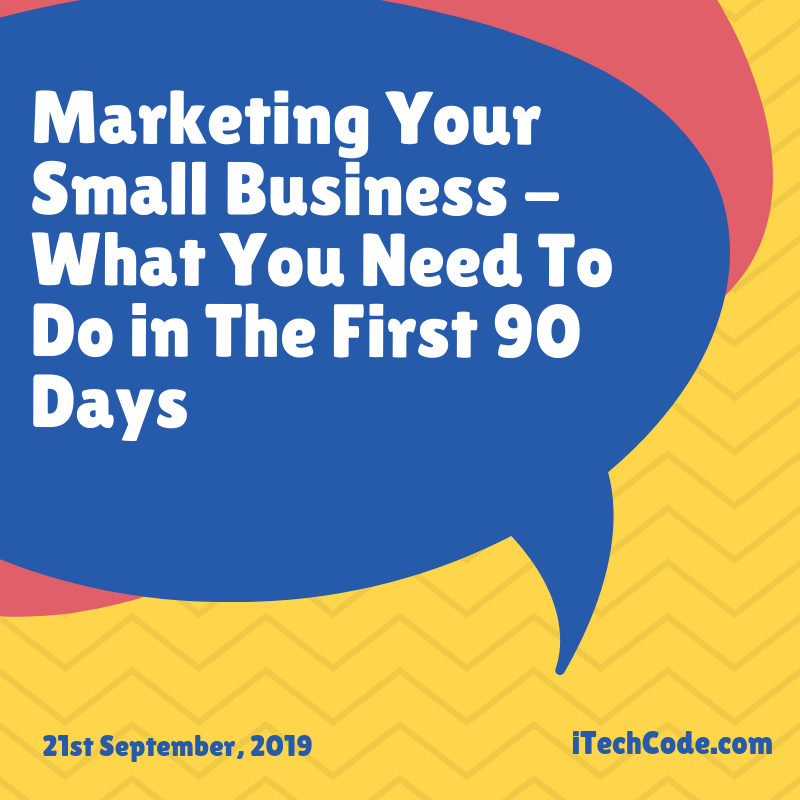Let’s face it, starting a small business and running it successfully can be a challenging endeavor for many. In most cases, you have bigger competitors to beat, limited resources to use, and a lack of experience to maneuver through the many unforeseen circumstances that arise without notice.
The most challenging bit of it all though is the startup phase – usually in the first couple of months when you have to figure everything on your own including testing whether the idea is sustainable or not. If this sounds like your current situation, this post is for you.
Here, we share five effective marketing steps you can take in the first 90 days of setting up your small business to help you hit the ground running.
Establish an online presence early
With every business competing for the waning attention span of customers, getting noticed in today’s business environment can be tricky especially when depending on a single source of traffic. This is why it’s important for you to be dynamic and establish a strong online presence of your business early. Sell your brand on as many platforms as you can including all the popular social media channels like Facebook, Twitter, Pinterest, Instagram, and LinkedIn.
While seeking to diversify your traffic sources, avoid neglecting your main channel where most of your customer acquisition and business take place. For example, if your company website is your primary marketing tool, make sure it’s well-designed and loads quickly. For example, you can choose one of the reliable hosting providers reviewed by Mangomatter to enhance user experience and improve availability.
Target a specific audience
While a small business needs to remain flexible and adjust easily to market needs particularly during those early days, it must define its target audience to stand a chance of surviving. Narrow down your focus to the small group of people you wish to conduct business or partner with. This is important to avoid wasting time and resources on the rest that hardly offer any significant gains to you.
Start by categorizing the audience by age, gender, or region to understand the kind of people you’re engaging. While at it, figure out their goals and expectations to judge whether they align with yours. Remember, when your business is still young, the goal is to establish a loyal customer base which is why it’s important that you only enter into business where benefits are mutual, long-term, and foreseeable.
Strive to always offer value before selling
Most businesses tend to focus so much on selling the features of a brand rather than the benefits it offers to the users. However, effective marketing dictates that you should always begin by educating the reader on how your product helps them solves their problems before you can even outline its features. As an entrant into a market that probably already has others selling products and services like yours, emphasize on showing users how you’ll fill the gap that your competitors are yet to cover. Put otherwise, show them how your brand stands out from the pack and the reason they can find more value using your products as compared to your competition.
Optimize content for search engines
Search engines can be your number one source of traffic if you optimize your content and site design for easy scanning by search engine bots and visitors. However, not everyone starts a business as an SEO expert. So, what can entrepreneurs with zero SEO skills do within 90 days?
For a start, if you can afford a professional digital marketer with a good track record and experience doing SEO, don’t hesitate to hire them. Alternatively, you can choose to teach yourself about the basics of SEO and do it yourself. For example, you can learn how to make your webpages responsive on all browsing platforms, craft attractive content, titles, and meta descriptions, and also creating backlinks to your site.
Engage visitors
Humans are emotional beings – a secret that the best business owners (and psychologists) understand and use to their advantage. If you’re to find success promoting your new business, your marketing strategy should be geared at controlling the feelings of your target audience. A simple approach you can use here is to always recognize and appreciate your visitors before they even become your customers. Look for ways to interact with users and gather as much feedback from them as you possibly can. For example, you can enable comment sections and be an active responder to their queries and concerns.
By engaging visitors, it becomes easy for them to trust your brand and ultimately buy from you. In addition, you’re able to identify possible areas of improvement based on the feedback you’re getting from the market.
What challenges are you facing when trying to sell and manage your new business? We’d love to hear your feedback.

You can also stay updated by subscribing to iTechCode.